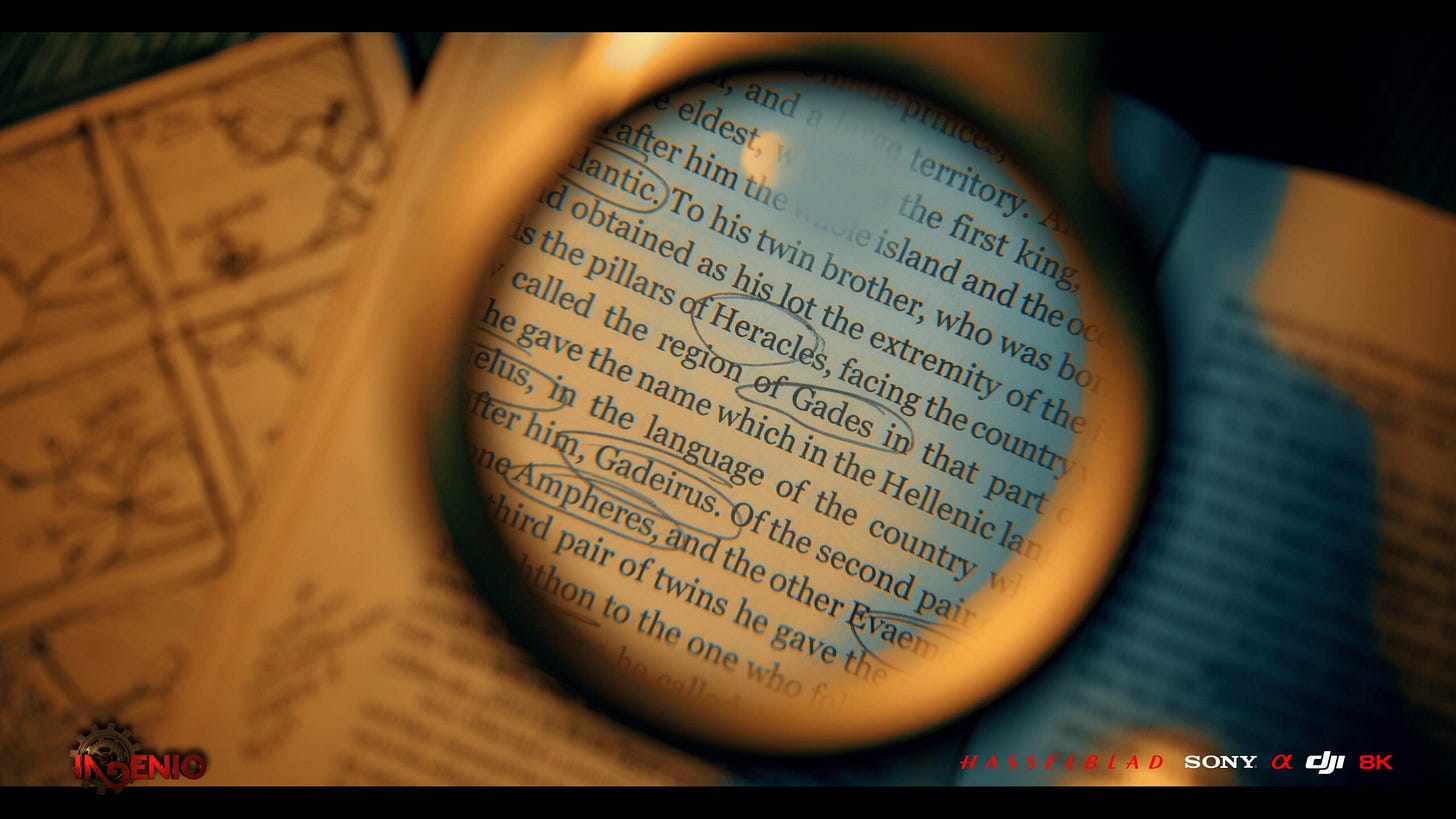Notes from Summer 2025
Quick plug: our previous Q&A guest, geomythologist Tim Burbery from West Virginia, has a new TED-Ed animation out, on dragon legends.
Other quick plug: The 2025 edition of Derek Skillings’ Philosophy and Biology Shop Talks is happening this week. I went in 2022 (when it was still called POBAMA) and had a good time (except for the chiggers).
What is the opposite of a plug? (A gulp, maybe?) This past weekend I went to HeroesCon in Charlotte with an old friend from Kentucky instead of this gullfest.
I presume that Graham Hancock was not there because after two Netflix series, his speaker fees are so high they couldn’t afford him. There was also the premiere of this series.

YES, we ARE talking about THE Atlantis, the very same Atlantis Plato wrote about in so much detail. Hundreds of people have attempted to decipher Plato’s clues in order to find the Lost Empire. Many have speculated as to its actual location, sometimes coming close. We we able to identify artifacts, which matched Plato’s descriptions of Atlantis, down to the most crucial details… EXACTLY as Plato described them!!
I am not so arrogant as to say that our current conceptions of history could not use some expanding, but I’m not much interested in what this Medium article calls “atheism for fundamentalists.”
Note the dichotomy here. Either “God(s) did X,” or else it must have been aliens . . . You can keep something fairly close to the literal meaning of the texts, but skip the metaphysics.
I prefer Larry Niven’s more imaginative, poetic (and totally fictional) version of Atlantis from The Magic Goes Away.
"When the mana runs out, I'll go like a blown candle flame, and civilization will follow. No more magic, no more magic-based industries. Then the whole world will be barbarian until men learn a new way to coerce nature, and the swordsmen, the damned stupid swordsmen, will win after all."
— Warlock
He was openly writing about the oil shocks of the 70s and more broadly the nature of extractive commerce, still relevant today. He was also pushing back on the brawn-over-brains tendencies of sword & sorcery, which was hugely popular at that time, and which I also dislike.

More importantly from an SF/Fantasy point of view, he was one of the first authors to apply logic to magic, which led directly to Brandon Sanderson and all the other hard magic systems of today.
Original post from November 2022
Cash Cows of the Gods
Seven years ago tonight (I’m writing this on Wednesday the 23rd) I went to Greensboro College to see a lecture by Graham Hancock, which formed the basis of one of my first columns for the Intergalactic Medicine Show.
Some days, you just want to smack a crackpot. It's not very professional, but it's very human and very satisfying. So on the night of November 23, 2015 I went to Greensboro College, expecting some serious silliness in the vein of National Treasure or DaVinci's Demons. Imagine my surprise, then, to find myself watching a polite and sober scientific debate.
Hancock has a new series out on Netflix, recycling a lot of that material, some of which is the same old Bimini Road stuff that’s been on TV since its discovery in 1968. Leonard Nimoy did an episode called “The Bimini Wall” on In Search Of in 1980, 42 years ago. However, Hancock also co-opts a lot of new discoveries in archaeology, like the discoveries of the Gunung Panang complex in Indonesia, or of the neolithic hill sites in Turkey, Gobekli Tepe and Karahan Tepe, both of which are part of a large network, most of which I’d never heard of before.

So yes, I learned quite a lot from watching this series, like the underground cities carved into volcanic ash beds in another Turkish region called Cappodocia, which Hancock claims are survival bunkers carved by survivors of Atlantis, afraid of another cataclysmic meteor shower, as described in my earlier piece for IGMS. The facts are fascinating. You just have to take the interpretations with a grain of salt. There are lots of reasons why cultures might build ritual spaces and sky-watching observatories, lots of reasons to track the solstices, and lots of reasons why those monuments might grow over time. The giant Moai statues on Easter Island, which also got bigger over time, may have been the result of runaway competition between clans. But that’s not as good a story, right? (Yes, I am comparing Graham Hancock to genius artist and pseudo-historical crackpot Stansislav Szukalski, as I earlier compared him to Olof Rudbeck, discoverer of Atlantis in Sweden, in that fourth column).
Hancock also loves to play the martyr card, claiming that his dogged pursuit of the truth has made him enemies among the archaeologists. I completely agree that scientists have blind spots. Everybody does. Thomas Kuhn made a whole career describing the dynamics of scientific revolutions. But that’s not the reason people dislike Graham Hancock. They dislike him because he’s a dick.
I had opportunity to observe his dickishness personally during that long-ago lecture. From the podium, he went off on a multiple-minute-long rant, complaining about the college’s AV people for their incompetence in setting up his slideshow, and at one point threatened to leave the stage because he said the stage lights were about to give him a migraine. As soon as he got his way, the tantrum ended and he went on as though nothing had happened. His tone during the new TV show is much more subdued and reasonable, but I have to wonder how many takes were required to create that impression.
There are better reconstructions of ancient history, like this episode of Secrets of the Dead, where they show convincingly that Egypt at the time of the Old Kingdom was not a desert but a grassy savannah, crisscrossed by waterways full of a smaller, more docile species of crocodile that they raised on farms for the purposes of mummifying them as sacrifices to Sobek, the crocodile god (who does not appear in the MCU Moon Knight, which I watched over Thanksgiving week with my kid, who was in town for the holiday after a trip to Amsterdam).
The Feathered Serpent
We also went to see the new Marvel spectacle, Wakanda Forever, paying $13 per ticket (and $8 for a Mountain Dew slushie!). The “villain” of the piece is Namor the Sub-Mariner, prince of Atlantis, who has been around from the very beginnings of the superhero genre. Superman debuted in August 1938; Namor appeared with the Human Torch only a few months later in early 1939. Aquaman is actually the cheap knock-off of Namor, though Aquaman is much better known because DC’s intellectual property is locked down more securely.

Graham Hancock goes on about Quetzalcoatl — the Aztec name for the god-hero called the Feathered Serpent — being a real person, one of his “civilizing heroes,” who supposedly escaped the drowning of Atlantis and taught the hunter-gatherers stoneworking, agriculture, and astronomy. He imagines them as something like the five Wizards of Middle-Earth, who are supposed to lead the Free Peoples out of their servitude to Sauron (except human). The watercolor animations in the series show Quetzalcoatl arriving from the sea, as the legend says, on a boat with no visible means of propulsion.
The MCU’s re-imagining of Namor makes him the Feathered Serpent, though they use the Mayan name, Kukulkan. This is also the first time I’ve heard the word mutant in an MCU property (in earlier phases of the MCU, many mutant characters were retconned into being Inhumans, because Sony had the movie rights to the X-Men and wouldn’t allow crossovers). In the comics, Namor is both a hybrid, human/Atlantean, and an Omega-level mutant. In TSR classic Marvel Super-Heroes game terms, exposure to vibranium in the womb would probably be an epigenetic change, making Namor an Altered Human rather than a Mutant, but that’s nerdy nit-picking even for me.
Personally, I was very happy with the redesign. Namor as the centuries-old ruler of the secret underwater Mayan kingdom of Talokan was a welcome twist on the mythology. Making him indigenous and practically a terrorist was certainly one way to avoid unflattering comparisons with Jason Momoa’s Aquaman (who is basically the classic bar-brawling barbarian Namor from the early comics, almost an underwater Conan; nobody glowers like Momoa). In addition to being a Thor-level badass physically (at one point they compare his strength to the Hulk’s), this new Namor is also a thinker and strategist, a worthy opponent for high-level opponents like the kings of Wakanda and Latveria (meaning Dr. Doom, whenever he finally shows up in the MCU).
I’m curious about other opinions, however. What did you think?
The Man from Atlantis
All this talk of Atlantis just now reminded me of a show I watched as a kid, starring Patrick Duffy. There was also a Marvel comic book adaptation, which is all over eBay. I seem to remember there were talking Dobermans in one story. It disappeared from the grocery store spinner racks pretty quickly, and as far as I know, it has no connection with anything else. Might have been a fun guest-star in Ron McClung’s Visitors campaign, though.
It’s supposedly on Amazon Prime; I may check it out this weekend, in between episodes of grading.
Until next week, Imperius Rex!





Jesus doc! You had me at 'gulp' - hope your summer is good and hott.
I picked this up from the Little Free Library table at the Farmer's Market.
http://www.trashotron.com/agony/reviews/2003/bradley-fall_of_atlantis.htm
130 pages in, the only thing I've gotten out of it is pinkeye.